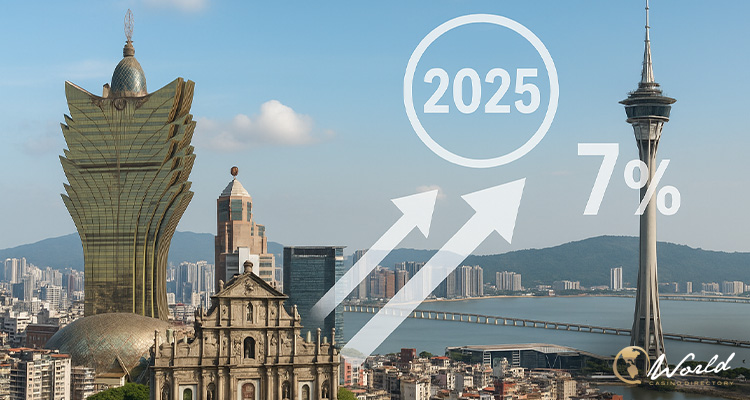Seaport Research Partners has upgraded its 2025 gross gaming revenue (GGR) forecast for Macau to 7% year-over-year growth, citing a solid second-quarter performance and a brighter outlook for the remainder of the year. According to senior analyst Vitaly Umansky, momentum is returning to the region, and GGR could potentially rise by as much as 9% in the second half of the year.
The revised estimate contrasts with a more cautious forecast from Macau’s government, which recently lowered its own GGR projection for 2025 to MOP228 billion (US$28.2 billion)—a drop from its initial target of MOP240 billion. That downward revision implies annual growth of just 0.5%, far below earlier expectations of nearly 6%.
Rebound momentum carries into 2H25 and beyond:
Seaport’s positive revision reflects growing investor confidence in the long-term prospects of Macau’s gaming market, even as macroeconomic concerns persist in both China and the United States. “Q2 turned out better than expected for Macau, and investors are now shifting focus to the second half to assess the sustainability of this higher growth,” wrote Umansky in a recent research note, as reported by Asia Gaming Brief, citing Seaport Research Partners. He acknowledged that consumer sentiment in China remains muted, while the U.S. market, particularly Las Vegas, faces softening demand. Nonetheless, he cited improving visitor trends, targeted promotions, and stimulus measures as balancing factors.
In its update, Seaport highlighted a projected compound annual EBITDA growth rate of 9%, based on expectations of sustained GGR increases over the coming years. Umansky emphasized that “we continue to see Macau as a secular long-term growth market,” and forecasted continued 7% annual GGR growth for the next several years.
Operator performance and share shifts:
Among major casino operators, Seaport pointed to Galaxy Entertainment Group as a standout performer. The company gained 130 basis points in market share during Q2 and posted a 13% revenue increase alongside a 14% EBITDA rise. These results were attributed to the launch of the luxury Capella hotel and progress in Galaxy Macau Phase 3. The upcoming Phase 4, expected in early 2027, is anticipated to further enhance growth prospects.
Melco Resorts & Entertainment also recorded a notable quarter, achieving its highest Macau EBITDA since 2019. Its market share rose by 70 basis points year-on-year, fueled by improved operations at City of Dreams and Studio City. The company saw a 14% rise in revenue and a 23% jump in EBITDA. Seaport considers Melco undervalued, despite its recent share price climb.
Sands China, while experiencing a 20-basis-point dip in Q2 market share, is expected to benefit from ongoing enhancements at the Londoner and the return of the Venetian Arena. A possible reinstatement of dividends and refined marketing efforts are also factors supporting the company’s longer-term prospects.
Meanwhile, MGM China registered the strongest quarter-on-quarter share increase among all operators, gaining more than 70 basis points. Despite this, Seaport downgraded the stock to Neutral, noting limited upside potential after a strong performance. The parent company, MGM Resorts, also received a downgrade due to slowing cash flow from U.S. operations and increased capital spending in New York and Japan.
Seaport’s broader investment thesis focuses on enduring growth in Macau and Singapore’s gaming markets, while also highlighting opportunities in the United Arab Emirates for Wynn Resorts. Both Singapore casinos—Resorts World Sentosa and Marina Bay Sands—are currently undergoing multibillion-dollar expansions, contributing to long-term sector optimism.
Wynn Resorts’ upcoming Wynn Al Marjan Island project in the UAE is slated to open in 2027, adding another growth vector for the group. Umansky noted that market share dynamics are likely to favor larger operators such as Sands China and Galaxy, while smaller rivals may lose ground—especially if base mass recovery outpaces current projections.
Despite ongoing concerns about China’s economic environment and a softening U.S. gaming market, Umansky noted that “improving sentiment and stimulus” are now seen as counterbalancing forces. The rebound in Macau’s performance is already evident, with first-half 2025 GGR rising 4.4% year-over-year to MOP$118.8 billion (US$14.7 billion).
With the Q2 earnings season beginning shortly, Seaport expects the numbers to largely meet expectations. Umansky added that “Melco likely [had] the best quarter of the group in Macau,” reinforcing the firm’s confidence in the region’s near-term and long-term growth trajectory.



